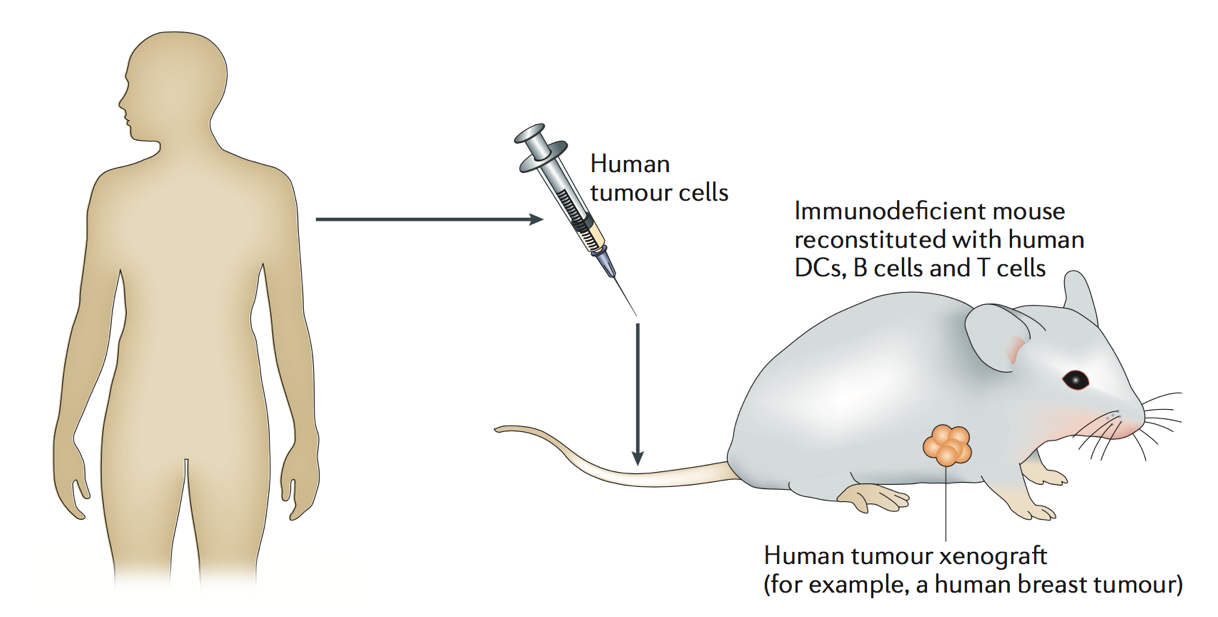Human tumor xenografts can be implanted directly into immunodeficient mice which may have been reconstructed with human immune cells, including dendritic cell (DCs), T cells and B cells. And this type of mouse models can be applied to characterize the human immune response in the condition that against a human tumor directly. Creative Biolabs has evaluated plenty of various compounds or novel anti-cancer agents in PDTX models and accumulated extensive experience in this new sort of mouse models.
Patient-Derived Tumor Xenograft (PDTX) Mouse Models
Recently, in order to observe the biology and therapeutic responses of tumors in human patients more closely, a kind of mouse models has been established in which tumor mass derived directly from human patients is implanted and developed in immune-compromised mice. This type of model is known as the “Patient-Derived Tumor Xenograft Model” or a PDTX model.
With the development of anti-tumor drug research, challenges may occur to researchers such as positive tumor responses in mouse models become non-effective when implemented in humans. PDTX models can provide highly efficient solution to solve this problem and thus become increasingly popular in the researches of cancer drug discovery.
Establishment of PDTX Mouse Models
PDTX are generated when cancerous tissue derived from a patient's primary tumor is implanted directly into an immunodeficient mouse. Several types of immunodeficient mice can be used to establish PDTX models: athymic nude mice, severely compromised immune deficient (SCID) mice, nonobese diabetic (NOD)-SCID mice, and recombination-activating gene 2 (Rag2)-knockout mice. The mice used must be immunocompromised to prevent transplant rejection.
 Fig.1 Humanized mouse tumor model (Dranoff, 2012).
Fig.1 Humanized mouse tumor model (Dranoff, 2012).
Features of PDTX in Creative Biolabs
-
More easily to develop tumors than cell line derived xenograft when implanted into immunodeficient mice.
-
The result of successfully grown tumor for PDTX is a heterogeneous patient tumor rather than a genetically divergent tumor for CDX.
-
PDTX models follow the pathways of drug resistance or the effects of the microenvironment on drug response found in human primary tumors.
-
Within PDTX models, patient tumor samples grow in physiologically-relevant tumor microenvironments that mimic the oxygen, nutrient, and hormone levels that are found in the patient's primary tumor site.
-
Implanted tumor tissue maintains the genetic and epigenetic abnormalities found in the patient.
Application
PDTX platforms can be used to characterize the human immune response that is directed against human cancer. Other potential applications include the optimization of immunotherapy and the identification of vital immune routes that accelerate tumor development. PDTX models are in favor of applying to study therapeutic responses to drugs since multiple therapies can be tested against one biopsy and pre- and post-treatment data can be acquired from the human biopsy and xenograft tissues, potentially ensuring patients avoid suffering workless therapies.
Why choose us?
Our scientists have established a variety of patient-derived tumor xenograft mouse models for drug safety and efficacy studies, including breast, prostate, colorectal, lung, and many other cancers. With professional knowledge and comprehensive capability, Creative Biolabs can support you to evaluate novel anti-tumor agents in a timely and cost-effective method.
If you have further requirement about Creative Biolabs' animal models or drug discovery service, please contact us for more details.
As a world leader in the industry of drug discovery, Creative Biolabs has extensive experience in designing rodent tumor models to meet specific needs of our customers, which including but not limited:
Reference
-
Dranoff G. Experimental mouse tumour models: what can be learnt about human cancer immunology?. Nature Reviews Immunology. 2012, 12(1): 61.
For Research Use Only.

 Fig.1 Humanized mouse tumor model (Dranoff, 2012).
Fig.1 Humanized mouse tumor model (Dranoff, 2012).